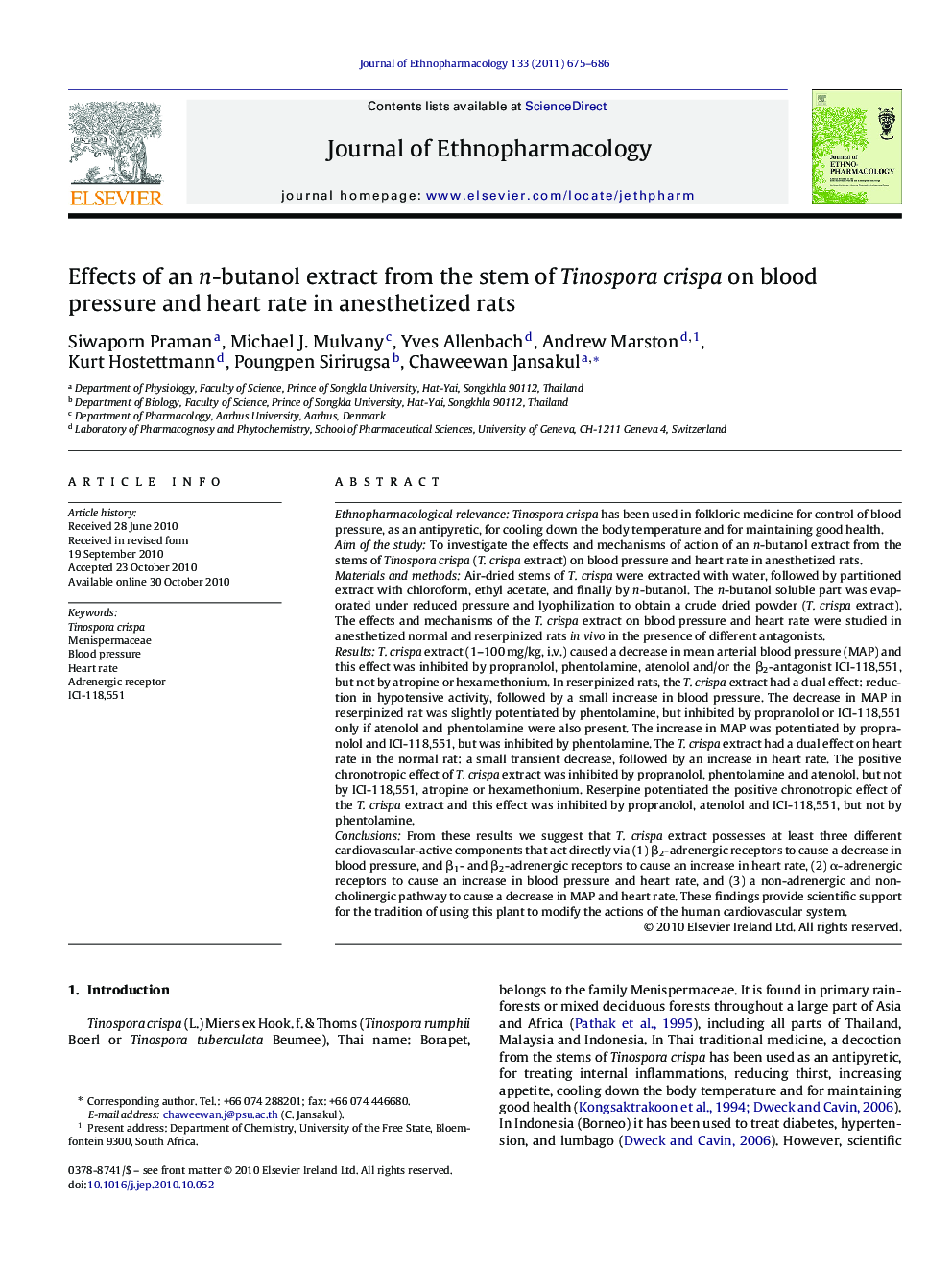| کد مقاله | کد نشریه | سال انتشار | مقاله انگلیسی | نسخه تمام متن |
|---|---|---|---|---|
| 5840060 | 1124004 | 2011 | 12 صفحه PDF | دانلود رایگان |

Ethnopharmacological relevanceTinospora crispa has been used in folkloric medicine for control of blood pressure, as an antipyretic, for cooling down the body temperature and for maintaining good health.Aim of the studyTo investigate the effects and mechanisms of action of an n-butanol extract from the stems of Tinospora crispa (T. crispa extract) on blood pressure and heart rate in anesthetized rats.Materials and methodsAir-dried stems of T. crispa were extracted with water, followed by partitioned extract with chloroform, ethyl acetate, and finally by n-butanol. The n-butanol soluble part was evaporated under reduced pressure and lyophilization to obtain a crude dried powder (T. crispa extract). The effects and mechanisms of the T. crispa extract on blood pressure and heart rate were studied in anesthetized normal and reserpinized rats in vivo in the presence of different antagonists.ResultsT. crispa extract (1-100 mg/kg, i.v.) caused a decrease in mean arterial blood pressure (MAP) and this effect was inhibited by propranolol, phentolamine, atenolol and/or the β2-antagonist ICI-118,551, but not by atropine or hexamethonium. In reserpinized rats, the T. crispa extract had a dual effect: reduction in hypotensive activity, followed by a small increase in blood pressure. The decrease in MAP in reserpinized rat was slightly potentiated by phentolamine, but inhibited by propranolol or ICI-118,551 only if atenolol and phentolamine were also present. The increase in MAP was potentiated by propranolol and ICI-118,551, but was inhibited by phentolamine. The T. crispa extract had a dual effect on heart rate in the normal rat: a small transient decrease, followed by an increase in heart rate. The positive chronotropic effect of T. crispa extract was inhibited by propranolol, phentolamine and atenolol, but not by ICI-118,551, atropine or hexamethonium. Reserpine potentiated the positive chronotropic effect of the T. crispa extract and this effect was inhibited by propranolol, atenolol and ICI-118,551, but not by phentolamine.ConclusionsFrom these results we suggest that T. crispa extract possesses at least three different cardiovascular-active components that act directly via (1) β2-adrenergic receptors to cause a decrease in blood pressure, and β1- and β2-adrenergic receptors to cause an increase in heart rate, (2) α-adrenergic receptors to cause an increase in blood pressure and heart rate, and (3) a non-adrenergic and non-cholinergic pathway to cause a decrease in MAP and heart rate. These findings provide scientific support for the tradition of using this plant to modify the actions of the human cardiovascular system.
Crude extract of Tinospora crispa contained cardiovascular active components that act directly via α and/or β-adrenoceptors, and non-adrenergic, non-muscarinic receptors of the cardiovascular system to cause a decrease in blood pressure and increase in heart rate in anesthetized rats.87
Journal: Journal of Ethnopharmacology - Volume 133, Issue 2, 27 January 2011, Pages 675-686